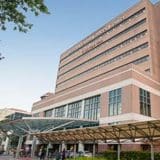

Doctors Affiliated with this Treatment Facility
Thoracic Center
1515 Holcombe Boulevard
Main Building, Elevator B Floor 9
Houston, TX 77030
01. History
History of The University of Texas MD Anderson Cancer Center
In 1941, the Texas legislature appropriated $500,000 to create a new cancer hospital and research center as part of The University of Texas System. Its original name was the Texas State Cancer Hospital and the Division of Cancer Research, but the following year, the hospital was renamed as the MD Anderson Hospital for Cancer Research of The University of Texas. The new name recognized monetary support from the MD Anderson Foundation, a foundation formed by a Tennessee banker and cotton trader named Monroe Dunaway Anderson.
For its first decade, the hospital operated out of temporary quarters: a converted residence and 46 beds leased in another Houston hospital. The hospital moved to its current location in 1954. That original building, clothed in pink marble, has been preserved and is now the core of a series of more modern buildings that surround it. While the location stayed the same, the hospital’s name would change two more times in the coming years: In 1955, its name was changed to the University of Texas MD Anderson Hospital and Tumor Institute at Houston, and in 1988 it became known as The University of Texas MD Anderson Cancer Center, as it remains today.
Since 1944, MD Anderson has served more than 800,000 cancer patients, providing such services as surgery, chemotherapy, radiation therapy and immunotherapy. In 2010, the hospital treated 105,000 cancer patients, about one-third of whom traveled to the hospital from out-of-state. That same year, MD Anderson had approximately 10,000 patients taking part in clinical trials, making it the largest clinical trials program in the United States. The cancer center continues to grow at a very fast rate, increasing its size by 50 percent in the past decade alone. Research is an equally integral part of MD Anderson’s work; in 2010, the hospital spent nearly $550 million on research initiatives.
02. Mesothelioma Care
Mesothelioma Care at The University of Texas MD Anderson Cancer Center
The University of Texas MD Anderson Cancer Center has a Thoracic Center that offers cutting edge multimodal treatment for patients with mesothelioma cancer. The Thoracic Center employs more than 30 mesothelioma specialists that continuously work to develop better, more effective treatment options for the cancer through numerous clinical trials, many of which are only available at MD Anderson. Their research has largely focused on developing new diagnostic techniques to allow for earlier detection, targeted radiation therapy and new targeted agents.
The Thoracic Center utilizes proton therapy, targeted radiation therapy and minimally-invasive video-assisted thoracoscopic surgery (VATS) to provide their patients with the best quality of life and lung function possible. Treatment plans are personalized, based on an individual’s particular case, including the stage of cancer and patient age.
The MD Anderson Thoracic Center team which includes medical oncologists, pathologists, pulmonologists, radiation oncologists and surgeons treats the entire patient, not just their mesothelioma. The connection to other areas of care offered at MD Anderson ensures that patients feel supported throughout their entire cancer journey.
03. Specializations
The University of Texas MD Anderson Cancer Center Specializations
- Chemotherapy
- Extrapleural pneumonectomy (EPP)
- Intensity-modulated radiation therapy (IMRT)
- Mesothelioma
- Mesothelioma clinical trials
- Pleurectomy or pleurectomy/decortication (P/D)
- Proton therapy
- Radiation therapy
- Video-assisted thoracoscopic surgery (VATS)
04. Accreditations
The University of Texas MD Anderson Cancer Center Accreditations
- Best Hospital National Cancer recognition from U.S. News & World Report
- Designated Comprehensive Cancer Center
- Member of the National Comprehensive Cancer Network
05. Mesothelioma Clinical Trials
Mesothelioma Clinical Trials at The University of Texas MD Anderson Cancer Center
The following clinical trials are in progress or actively recruiting participants at The University of Texas MD Anderson Cancer Center:
Study of TBio-6517 Given Alone or in Combination With Pembrolizumab in Solid Tumors
Conditions: Carcinoma, Melanoma, Mesothelioma, Oropharynx Cancer, Renal Cell Carcinoma, Solid Tumor
Last Updated: March 10, 2023
Status: Recruiting
Locations: Phoenix, AZ. Jacksonville, FL. Miami, FL. Kansas City, KS. Boston, MA. Rochester, MN. Billings, MT. Houston, TX.
Phase 1/2 Trial of Gavo-cel (TC-210) in Patients With Advanced Mesothelin-Expressing Cancer
Conditions: Lung Neoplasms, Carcinoma, Non-Small-Cell Lung, Mesothelioma, Mesothelioma, Malignant, Cholangiocarcinoma
Last Updated: May 27, 2022
Status: Recruiting
Locations: San Francisco, CA. Bethesda, MD. New York, NY. Philadelphia, PA. Nashville, TN. Houston, TX.
06. Hospital Services
Patient and Family Services at The University of Texas MD Anderson Cancer Center
The University of Texas MD Anderson Cancer Center offers many support resources for patients and family members. Some resources include:
- Housing
- Integrative Medicine Center
- Palliative Care and Rehabilitation
- Peer-to-Peer Support
- Social Work and Counseling
- Support Groups
- Supportive Care Clinic
- Survivor Wellness Program
07. Offsite Services in Houston
Patient and Family Services in the Houston Area
The University of Texas MD Anderson Cancer Center is located in the major metropolitan area of Houston. As a result, many services are easily accessible for mesothelioma patients and their families during or after treatment. These offsite services include counseling, hospice, housing and pain clinics.




